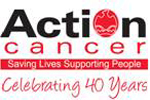 Geraldine Kerr, Head of Professional Services for Action Cancer, said: “If bowel cancer is detected in its earliest stages the individual has more than a 9 in 10 chance of surviving the disease so we want to ensure that the public are aware of the most common early signs and symptoms like having blood in your stools, loose and more frequent bowel movements or pain and swelling in your abdomen for a prolonged length of time.
“It’s important to note that there are many other common conditions with similar symptoms that will affect us at some time in our lives, so most people with these symptoms do not have cancer. But if you are experiencing one or more of these symptoms we would recommend you seek advice from your GP immediately.”
The Northern Ireland Bowel Cancer Screening Programme offers screening every two years to men and women aged 60 to 71. It aims to increase the proportion of cases detected at an early stage of the disease before symptoms develop and when the chance of successful treatment is greatest. Since April 2010 the programme has screened nearly 200,000 participants and detected nearly 200 cancers at an early stage.
People aged 60 – 71 are sent an invitation, information materials and a screening kit so they can do the test at home. Recipients are asked to collect small stool samples on a special card and send the kit to a screening laboratory which checks for tiny traces of blood. The presence of blood in the stool sample indicates that more investigations are needed. The results are issued within two weeks of sending in the test.
For more information about the signs and symptoms of bowel cancer please visit www.actioncancer.org to download the bowel cancer leaflet. To find out more on the Northern Ireland Screening Programme please visit www.cancerscreening.n-i.
Geraldine Kerr, Head of Professional Services for Action Cancer, said: “If bowel cancer is detected in its earliest stages the individual has more than a 9 in 10 chance of surviving the disease so we want to ensure that the public are aware of the most common early signs and symptoms like having blood in your stools, loose and more frequent bowel movements or pain and swelling in your abdomen for a prolonged length of time.
“It’s important to note that there are many other common conditions with similar symptoms that will affect us at some time in our lives, so most people with these symptoms do not have cancer. But if you are experiencing one or more of these symptoms we would recommend you seek advice from your GP immediately.”
The Northern Ireland Bowel Cancer Screening Programme offers screening every two years to men and women aged 60 to 71. It aims to increase the proportion of cases detected at an early stage of the disease before symptoms develop and when the chance of successful treatment is greatest. Since April 2010 the programme has screened nearly 200,000 participants and detected nearly 200 cancers at an early stage.
People aged 60 – 71 are sent an invitation, information materials and a screening kit so they can do the test at home. Recipients are asked to collect small stool samples on a special card and send the kit to a screening laboratory which checks for tiny traces of blood. The presence of blood in the stool sample indicates that more investigations are needed. The results are issued within two weeks of sending in the test.
For more information about the signs and symptoms of bowel cancer please visit www.actioncancer.org to download the bowel cancer leaflet. To find out more on the Northern Ireland Screening Programme please visit www.cancerscreening.n-i.
Bowel Screening Overview
* Men and women aged 60 to 71 are eligible for screening
* These people will receive a letter, a leaflet explaining the test and a home testing kit in the post every two years
* Recipients are asked to collect small stool samples on a special card and send the kit to a screening laboratory for examination
* If blood is found in the sample you will be invited for more tests. Blood in your stools does not always mean cancer
* The results are issued within two weeks of sending in the test
* Around 98 in 100 people will receive a normal result
* Research shows that regular bowel cancer screening reduces the risk of dying from bowel cancer by 16%.
* * *
 2013 marks Action Cancer’s 40th anniversary – 40 years spent working to save lives and support the people of Northern Ireland. Since its foundation, Action Cancer has screened over 140,000 women for breast cancer.
The charity relies heavily on donations from the public and business communities in Northern Ireland to provide its range of vital, life-saving services including digital breast screening services (40-49 and 70+), MOT health checks, counselling, life coaching, complementary therapies, Listening Ear Service and health promotion.
Services are available regionally onboard the Big Bus and at Action Cancer House in Belfast.]]>
2013 marks Action Cancer’s 40th anniversary – 40 years spent working to save lives and support the people of Northern Ireland. Since its foundation, Action Cancer has screened over 140,000 women for breast cancer.
The charity relies heavily on donations from the public and business communities in Northern Ireland to provide its range of vital, life-saving services including digital breast screening services (40-49 and 70+), MOT health checks, counselling, life coaching, complementary therapies, Listening Ear Service and health promotion.
Services are available regionally onboard the Big Bus and at Action Cancer House in Belfast.]]>
























